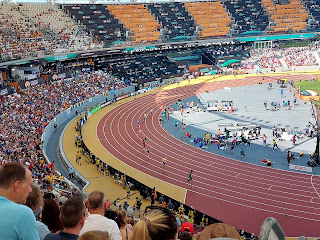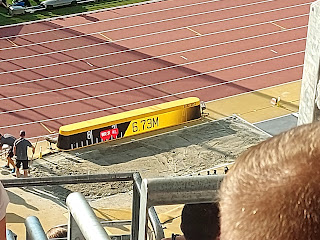Clicca qui per la versione italiana
I wake up at 6 a.m. and leave a little later than planned for Heroes' Square, where the women's 20 km race walk starts at 7.15 a.m. Naturally fasting, breakfast at the hotel does not start so early. I manage to arrive with the race started by just over a minute: I look for the nearest free place and find it at the end of the straight stretch (end in the direction of the race, beginning in relation to where I come from), before the lap around the square. The athletes pass first, on the outward journey, from the opposite side, then, on the return journey, from mine. At the finish line there is a grandstand, but it is almost empty, so one must assume that it is not open to the public. The attendance at race walk events is always different from the one at the stadium: the locals are hardly visible (as in London, where it was almost all locals at the stadium). As soon as I arrive I see a group of Chinese, then I see many Italians, also around my place (including a lady with a strong Apulian accent and a dad with a little boy), French (in surprising numbers, given the level of their walkers), Mexicans, but in the final the Spanish come out.
As early as the third lap (of 1 km) a group of seven, including Palmisano took off, towards the middle of the race they were joined by an eighth and the situation did not change until the last three laps. On lap 13 the speaker announced Palmisano's fall and on the passage I saw her detached by a few metres, but by the start of the next lap she had already recovered. The other Italians float between 15th and 20th position, then in the final they lose something. Trapletti is among those with the most suffering look and often passes very close to the barriers. On lap 16 the Spaniard Perez attacked and Palmisano seemed to give way to the whole group, but by the end of the lap she was already back in third. At the start of the last lap she is third with a reassuring lead, on the return way of the lap she can also stop to take the flag. At the end the top 10 will be of 10 different nationalities, the top 16 of 14. It is said that race walk is less 'universal', but in track or field events when has anything like this ever been seen?
When Palmisano arrives I leave: I feel sorry for the other athletes, but at 9 a.m. the stadium races start. I know I'll see them start, but I hope to see at least one throw by Osakue and Mangione's heat in the 400: I won't make it with either of them. I find out that Osakue is seventh after her group, so we will need to wish bad luck to the throwers of second group. We succeed in it: after the first round she is still tenth, but there are two who seem impossible they will not to overtake her. In fact in the second round they overtook her and she is 12th, but she will stay there until the end.
I am in a good position not only for the discus and long jump, as I had already seen yesterday (there is the heptathlon LJ, and it is always worth watching the heptathletes closely) but also for the high jump qualification. The first Italian I see, however, is Re, who comes back in the final to finish fourth in 45.07. He is the fourth of the repechage (out of six) and will remain so. This was followed by the 400hs, where there was great curiosity for Sibilio, who finished fourth and ended up being the qualifier with the worst time: it is difficult to say to what extent he was in control, in the final he had in any case slowed down.
But for us the highlight of the morning was the high jump qualification. Fassinotti immediately started to make faults: 2.14 and 2.18 at the second, Sottile at least did them at the first. Tamberi enters the competition at 2.22, like Barshim, immediately seeking the applause of the public. At 2.25 both he and Fassinotti succeed at the second, while Sottile exits. After the first round at 2.28 it is clear that it will be the last height (2.30 was also planned): only four clear it, even Tamberi makes a clear fault. In the second Fassinotti makes it, while Tamberi strikes the bar down with his heel. Given his fault at 2.25, he really must do them, he has no hope of a repechage: at the third he clears it very clearly. In the end, 13 will overtake them, but that's the end of it. The American McEwen is impressive, who often climbs very high, but then strikes down with his heels: he will be saved in the third round at both 2.22 and 2.28.
There is also Dosso in the 100: she starts very well, for a while she is ahead of the Jamaican, then she is overtaken: she is fourth, but from the time of the first (10.92) she seems to be in a good position for the repechage. Then it turns out that instead she is third because one of those who had preceded her was out of the race as she was disqualified for a false start. The time is 11.14: Italian record equalled!
After also seeing Fofana and Simonelli pass the round, I leave, without seeing the last heats of the 110hs and the end of the heptathlon javelin I want to have a little more time to come back. In fact, the break is very short: if I didn't have a number of logistical reasons for going back to the hotel, it would be better to stay in the area.
The afternoon session starts with the 100 semi-final with Jacobs, but I leave late and cannot make it to watch it. I go in when the second semi-final is about to start: I decide to watch it from the screen, but then, after a false start I try to get in and watch it from the first ring. You can in fact enter the first deck having a ticket for the second, also because the bars and toilets are there: just can't enter the stands. I see it badly anyway, without understanding anything.
I get to my place anyway for the start of the women's long jump. On the first round, 7 fouls out of 12, including Iapichino. Diame takes the lead with 6.82: from my position it didn't look that long. My position leads me to underestimate the jumps by at least twenty centimetres, sometimes more. In the jumps framed on the screen virtual lines appear every 20 centimetres: and to say that there was a time not so long ago when one could measure a jump 60 cm longer hoping not to be caught (remember Rome 1987?)! Vulueta's second jump is immediately evident that it is very long, and in fact it is 7.05. Larissa makes 6.73: at least the first 8 are assured and the podium is 11 cm away.
The track events continued with the semi-finals of the 1500, first women's, then men's. In the women's first, Cavalli did so well that I had the feeling I was confusing her with someone else: instead she was sixth and went on to the final. In the second, Sabbatini slowly gave way, until she retired with 200 metres to go. At the finish it could be seen that the pace was monstrous, with 3:58.77 one was out of the final and 9 fell under 4'. In the men's first, Arese seemed to be cut off with 200 metres to go, but then came back up to touch qualification (at 15/100) and also the Italian record. I do not see the second semifinal because I go to get a drink. I also missed Iapichino's third jump, which was in any case a foul.
In the fourth and fifth rounds of the long jump not much happens: Vulueta improves again with 7.14 and Iapichino is sixth, also overtaken by Rotariu. Her sixth jump looked good, but not an improvement: instead it was 6.82, 2 cm from the podium. Immediately afterwards, however, Rotariu reduced her regrets by taking bronze with 6.88.
The key event for the local public was however hammer throw, with the medal hope Halasz: when he took the lead in the first round with 80.82, the crowd cheered as if the national football team had scored. He remained in the lead until the fourth throw, when Nowicki overtook him by 1 cm, then came third because on the fifth throw Canadian Katberg made everyone silent with 81.25.
On the track there is still the heptathlon:'s 800 Hall takes the lead, but Johnson-Thompson manages to get within 2 seconds of her and save the gold by 20 points, to the delight of my seat neighbours. The scoreboard shows a ranking without the runners who came in behind in the 800, so the audience is under the illusion that Kriszan has medalled, instead she is fourth. The 10,000 followed, a very tactical race: with 2 km to go they were still almost all in a group. On the third to last lap, 9 were left, even Crippa broke away and finished 12th. On the last lap Cheptegei took off and held the lead until the end, for silver the unknown (at least to me) Kenyan Ebenyo beats the Ethiopians. The Frenchman Schrub. ninth and first of the Europeans, celebrates as if he had won a medal with a group of fans (I saw someone wearing his shirt)
Only the 100 final remains. Less pompous presentation than in Doha, no special effects. Seville starts strong, then Lyles overtakes him, my impression was Lyles-Seville-Hughes. Instead second is Tebogo, who precedes Hughes and Seville, all with the same time.
It's a bit strange coming out of the stadium that it's still light. On the way out an animator explains why this session has been done at a different time from all the others: today is a Hungarian national holiday and there will be fireworks along the Danube.















Nessun commento:
Posta un commento